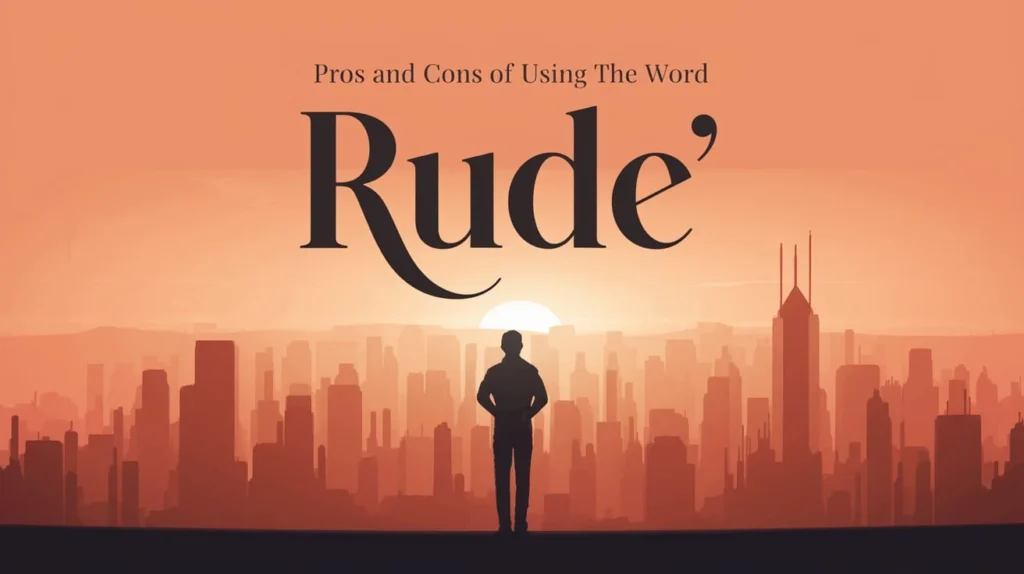Have you ever been in a situation where someone’s behavior left you feeling uncomfortable, but you weren’t sure how to explain it without sounding too harsh? The way we express ourselves matters. Finding the right words can make a huge difference when addressing sensitive situations, like when someone is being rude. Instead of using the simple phrase “That person is rude,” why not try something a little more thoughtful and nuanced?
This article explores 20 alternatives to saying “someone is rude” in a way that feels more personal and meaningful. Whether you’re dealing with a colleague, friend, or family member, these options will help you communicate with care and empathy.
What Does “Someone Is Rude” Mean?
Before we dive into the alternatives, let’s make sure we’re on the same page about what being “rude” actually means. When we say someone is rude, we usually refer to someone’s behavior or comments that are inconsiderate, disrespectful, or impolite. But rudeness isn’t always obvious—it can be subtle or even unintentional.
Maybe someone interrupted you during a conversation, or perhaps they made a comment that didn’t take your feelings into account. However you experience rudeness, it’s a behavior that leaves us feeling uncomfortable.
Is It Professional/Polite to Say Someone is Rude?
Let’s be real: calling someone “rude” can sometimes feel a bit confrontational. In professional or formal settings, it’s important to express ourselves carefully. Saying someone is rude outright can make things awkward and escalate the situation. Instead, it’s often better to find ways to express your discomfort without sounding judgmental or harsh. Professional communication is about being respectful, even when discussing difficult behaviors.
Pros and Cons of Using the Word “Rude”

Pros:
- It’s direct and clear.
- Everyone understands it.
Cons:
- It sounds judgmental.
- It can escalate conflict.
- It doesn’t offer a solution.
Synonyms for “Someone Is Rude”
- They lack consideration
- They could be more thoughtful
- They seem insensitive
- They are abrupt
- They are disrespectful
- They are impolite
- They are dismissive
- They are impatient
- They are aloof
- They are condescending
- They are harsh
- They are blunt
- They are tactless
- They are unkind
- They are short-tempered
- They are curt
- They are snappy
- They are sarcastic
- They are passive-aggressive
- They are unapproachable
1. “They Lack Consideration”
This phrase is perfect when you want to communicate that someone’s actions seem thoughtless or inconsiderate without directly calling them rude.
Scenario Example: Hi [Name],
I noticed that during the meeting yesterday, [Person’s Name] didn’t take into account everyone’s opinion before jumping in with their own. It left me feeling like my input wasn’t valued. I believe it would help the group if we could all be a bit more considerate of each other’s perspectives.
Best, [Your Name]
Best Use:
Use this when you want to express that the person is being inconsiderate, but you don’t want to outright call them rude.
Additional Note:
This approach softens the message while still addressing the behavior.
2. “They Could Be More Thoughtful”
Sometimes, we don’t want to label someone’s behavior as rude, but we still want to express that they could be more sensitive to others’ feelings.
Scenario Example: Hi [Name],
During our conversation earlier, I felt that [Person’s Name] could have been a bit more thoughtful when addressing my concerns. A little more patience would go a long way in improving our communication.
Best,
[Your Name]
Best Use:
This is great for situations where the person’s actions or words didn’t necessarily cross the line but still made an impact.
Additional Note:
This is a polite way of hinting that someone could improve without making it feel like a direct criticism.
3. “They Seem Insensitive”
Sometimes, it’s not just about being rude—it’s about lacking empathy. Saying someone is “insensitive” shows that you feel their actions didn’t take others’ emotions into account.
Scenario Example: Hi [Name],
I wanted to bring up a small concern from yesterday’s meeting. [Person’s Name] seemed insensitive when discussing the team’s progress, as they didn’t acknowledge the challenges we’re facing. A little more empathy would help strengthen our team dynamics.
Best,
[Your Name]
Best Use:
Use this when the person’s actions seem to lack empathy, especially in sensitive or emotional situations.
Additional Note:
This phrase helps convey that you’re more concerned with the emotional aspect of the interaction rather than just the behavior.
4. “They Are Abrupt”
If someone is being short or harsh in their interactions, you could say they are “abrupt.” It implies that their communication style feels rushed or brusque.
Scenario Example: Hi [Name],
During our call today, I felt that [Person’s Name] was a bit abrupt when addressing my feedback. It left me feeling like my concerns weren’t fully considered.
Best,
[Your Name]
Best Use:
This is ideal when someone’s response feels hasty or cut off, without much room for understanding or explanation.
Additional Note:
Using “abrupt” can help avoid sounding overly critical while still addressing a key issue in communication.
5. “They Are Disrespectful”
Disrespect is a stronger word than “rude,” but it still communicates that someone’s actions or comments have crossed a line. It’s important to use this carefully.
Scenario Example: Hi [Name],
I wanted to address a situation that occurred during the meeting yesterday. I felt that [Person’s Name] was disrespectful when they dismissed my idea without consideration. I think it’s important for everyone to feel respected and valued in our discussions.
Best,
[Your Name]
Best Use:
Use this when someone’s actions clearly cross boundaries and show a lack of regard for others.
Additional Note:
“Disrespectful” can be a strong word, so use it when the situation really calls for it.
6. “They Are Impolite”
Impoliteness is a gentler way to say someone’s behavior isn’t up to standard, especially when they aren’t being considerate or courteous.
Scenario Example: Hi [Name],
I noticed that during our conversation, [Person’s Name] was impolite by interrupting me while I was speaking. A bit more respect for turn-taking would help make our meetings more productive.
Best,
[Your Name]
Best Use:
This is a great phrase when someone’s behavior is not quite rude but still lacks the basic social politeness.
Additional Note:
“Impolite” carries a softer tone, so it’s a good option for addressing smaller issues without causing tension.
7. “They Are Dismissive”
Being dismissive is when someone brushes off others’ opinions or feelings without much consideration. It’s a subtle but powerful form of rudeness.
Scenario Example: Hi [Name],
I felt that [Person’s Name] was dismissive of my concerns in the meeting today. They didn’t seem to take my point seriously, which left me feeling unheard.
Best,
[Your Name]
Best Use:
Use this phrase when someone disregards your opinion or input without any real discussion.
Additional Note:
“Dismissing” someone can be more about ignoring or undermining, so use this when you want to express a feeling of being overlooked.
8. “They Are Impatient”
Impatience can often come across as rude, especially when someone cuts others off or expresses frustration without consideration.
Scenario Example: Hi [Name],
During today’s discussion, I felt that [Person’s Name] was impatient with the pace of the meeting. Their quick responses made it difficult for everyone to have their say.
Best,
[Your Name]
Best Use:
This phrase works well when someone’s behavior suggests they want things to happen on their terms, without giving others the space to contribute.
Additional Note:
Impatience often involves a sense of urgency, so if that’s part of the problem, this term might be a good fit.
9. “They Are Aloof”
Being aloof can feel like someone is emotionally distant or detached. This isn’t always “rudeness” in the traditional sense, but it can be off-putting.
Scenario Example: Hi [Name],
I noticed that during our meeting, [Person’s Name] seemed aloof. They didn’t engage much in the discussion, which made the collaboration feel one-sided.
Best,
[Your Name]
Best Use:
Use “aloof” when someone seems disconnected or disinterested, making it harder to establish meaningful communication.
Additional Note:
This can be helpful when the person is physically present but emotionally distant or disengaged.
10. “They Are Condescending”
Condescending behavior can be especially frustrating. It happens when someone talks down to others as if they’re superior or know better.
Scenario Example: Hi [Name],
I wanted to address a moment from today’s meeting where I felt [Person’s Name] was being condescending. They made a comment that felt belittling, and it didn’t help foster a collaborative environment.
Best,
[Your Name]
Best Use:
This is useful when someone’s behavior feels like they’re speaking to others in a way that suggests they’re superior.
Additional Note:
It’s important to use “condescending” only when the behavior truly feels patronizing.
11. “They Are Harsh”
Sometimes, people speak in a way that feels too sharp or severe. Instead of calling them rude, saying they are “harsh” softens the feedback while still making the point.
Scenario Example:
Subject: Concern About Communication Style
Hi [Name],
I wanted to mention that during our discussion earlier, [Person’s Name] came across as a bit harsh when addressing feedback. A gentler approach might help create a more open conversation.
Best,
[Your Name]
Best Use:
This is useful when someone’s tone or words feel too intense or critical.
Additional Note:
“Harsh” acknowledges the severity of their words without making it sound like an attack.
12. “They Are Blunt”
Being blunt isn’t always bad, but sometimes, it can come off as inconsiderate. If someone lacks tact in their communication, this phrase is a good alternative.
Scenario Example:
Subject: A Thought on Communication
Hi [Name],
I noticed that [Person’s Name] tends to be quite blunt in discussions. While I appreciate directness, a little more sensitivity could make conversations more constructive.
Best,
[Your Name]
Best Use:
Use this when someone speaks too directly without considering others’ feelings.
Additional Note:
Being blunt can be a personality trait, so this phrase helps highlight the issue without making it personal.
13. “They Are Tactless”
Tact is all about knowing how to say things in a way that is mindful of others. If someone frequently says things without thinking about how they’ll be received, this phrase fits.
Scenario Example:
Subject: Feedback on Team Discussions
Hi [Name],
I wanted to share that [Person’s Name] sometimes comes across as tactless in meetings. While I know they mean well, their wording can sometimes feel a bit too direct.
Best,
[Your Name]
Best Use:
This works well when someone isn’t intentionally rude but lacks social awareness.
Additional Note:
“Tactless” implies they could improve their communication skills rather than attacking their personality.
14. “They Are Unkind”
Kindness matters, and when someone isn’t showing it, their words or actions can feel harsh. This phrase communicates the impact of their behavior without sounding accusatory.
Scenario Example:
Subject: A Quick Concern
Hi [Name],
I wanted to mention that [Person’s Name]’s response during today’s meeting felt unkind. I know they may not have meant it that way, but it left a negative impression.
Best,
[Your Name]
Best Use:
Use this when someone’s words or actions seem to lack warmth or consideration.
Additional Note:
This phrase avoids being too harsh while still expressing disappointment.
15. “They Are Short-Tempered”
If someone frequently reacts with frustration or irritation, this phrase helps describe their behavior in a way that doesn’t feel like an outright insult.
Scenario Example:
Subject: A Thought on Communication
Hi [Name],
I’ve noticed that [Person’s Name] has been a bit short-tempered in recent discussions. It might help if we all took a moment to approach things with more patience.
Best,
[Your Name]
Best Use:
This works well when someone is rude due to frustration rather than intentional unkindness.
Additional Note:
It acknowledges their possible stress without excusing their behavior.
16. “They Are Curt”
Being curt means someone is speaking in a very brief, almost dismissive way. It can feel unfriendly or cold, especially in professional settings.
Scenario Example:
Subject: Quick Note on Team Dynamics
Hi [Name],
I’ve noticed that [Person’s Name] has been quite curt in emails lately. It might help improve team morale if we all made an effort to be a bit more welcoming in our communication.
Best,
[Your Name]
Best Use:
Use this when someone’s tone or responses feel too brief and unfriendly.
Additional Note:
“Curt” is a useful way to point out abruptness without making a big deal out of it.
17. “They Are Snappy”
If someone is responding sharply or with a bit of attitude, calling them “snappy” can describe the situation without making it sound too serious.
Scenario Example:
Subject: Quick Concern
Hi [Name],
I wanted to mention that [Person’s Name] seemed a bit snappy during our conversation earlier. I know we’re all busy, but a little more patience could help maintain a positive work environment.
Best,
[Your Name]
Best Use:
This phrase works when someone’s tone is sharp, but you don’t want to make a huge issue out of it.
Additional Note:
It keeps things light while still addressing the problem.
18. “They Are Sarcastic”
Sarcasm can be funny, but when used in the wrong context, it can come across as rude or dismissive. This phrase helps highlight when someone’s sarcasm feels inappropriate.
Scenario Example:
Subject: Concern About Tone
Hi [Name],
I noticed that [Person’s Name] used sarcasm when responding to a team member’s question earlier. While I know they didn’t mean harm, it might be helpful to keep communication more straightforward.
Best,
[Your Name]
Best Use:
Use this when someone’s sarcasm feels out of place or unhelpful.
Additional Note:
This phrase keeps the focus on tone rather than intent, making it easier to address.
19. “They Are Passive-Aggressive”
When someone expresses frustration indirectly instead of addressing an issue openly, their behavior can feel both rude and difficult to navigate.
Scenario Example:
Subject: A Quick Note on Communication
Hi [Name],
I’ve noticed that [Person’s Name] tends to be a bit passive-aggressive in emails. If there’s a concern, it might be best to address it directly so we can resolve things more efficiently.
Best,
[Your Name]
Best Use:
This phrase is perfect when someone avoids direct confrontation but still makes their frustration clear.
Additional Note:
It points out the issue without being too confrontational in return.
20. “They Are Unapproachable”
Sometimes, rudeness is about how someone carries themselves rather than what they say. If a person’s demeanor makes them seem distant or unwelcoming, this phrase fits.
Scenario Example:
Subject: Team Collaboration Suggestion
Hi [Name],
I wanted to bring up that [Person’s Name] sometimes comes across as unapproachable in meetings. It might help if we all made an effort to be more open and welcoming in discussions.
Best,
[Your Name]
Best Use:
Use this when someone’s body language or behavior makes them seem unfriendly.
Additional Note:
It focuses on how others perceive them rather than outright labeling them as rude.
Conclusion
There are countless ways to express that someone is being rude without actually using the word “rude.” By choosing a more thoughtful phrase, you can communicate your concerns in a way that promotes understanding rather than conflict. Whether you’re addressing a coworker, friend, or family member, these alternatives can help keep the conversation constructive and professional.
Next time you find yourself in a tricky situation, try one of these phrases—you might be surprised at how much smoother things go!















